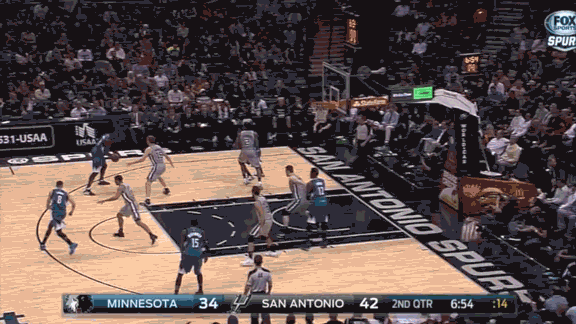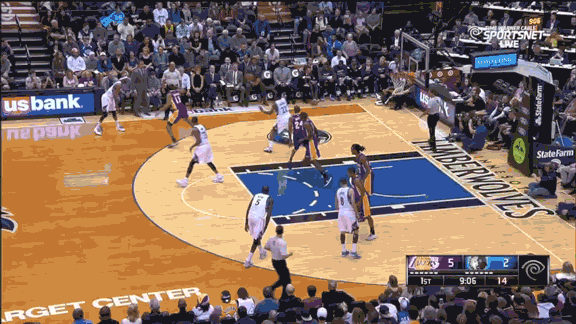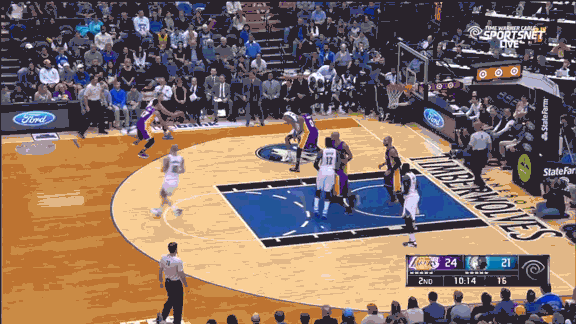Andrew Wiggins vs. 2003 LeBron
— -- It makes sense in so many ways to compare this year's No. 1 overall draft pick, Andrew Wiggins, to the current best player in the world, LeBron James. Not just because each was the top pick in loaded draft classes -- and drafted by Cleveland -- but because they are both elite-level athletes at the wing position who dominated their peers in high school and were clearly the best prospects in their classes. That's no small similarity.
Since 1998, the only players who were ranked as the top players in their class by every major high school scouting service were LeBron, Dwight Howard, Greg Oden and Wiggins. In fact, scouts who studied Wiggins in high school wrote that he was the best athlete as a forward since LeBron.
Is Wiggins on track to be a superstar like LeBron? Let's examine how LeBron played as a rookie, compared to what we're seeing from Wiggins. Given that Wiggins spent a year getting fine coaching on the fundamentals at Kansas, is he a better player now than LeBron was in 2003?
2014 Wiggins vs. 2003 LeBron: Athleticism and motor
When evaluating how athletic a player is, it is wise to also consider the player's motor. A lazy but gifted athlete will often be outdone in the "athlete" category by a less athletic player who simply tries harder. But toughness and relentlessness are talents that can be developed in some cases, which is where we begin with Wiggins.
Purely as a physical specimen -- combining his speed, quickness, jumping and overall agility -- Wiggins might indeed be slightly more athletic than LeBron was in his first season. This may sound absurd when considering what a freak athlete LeBron was at 18 years old (and about 45-50 pounds heavier than Wiggins), but that's just how gifted Wiggins is.
However, and this is the point, Wiggins' athleticism doesn't always show on the court. That's because his motor is just mild most of the time, so his supreme athletic gifts are not registering as often as we saw from LeBron when he was a rookie playing with a hot motor at all times. Wiggins appears to be faster than 2003 LeBron, but only when he doesn't have the ball or is running at his top speed. In order to see how LeBron made a greater impact with his athleticism, just look at his 2003 stats.
Wiggins may be a better pure athlete than LeBron, but he is not using those gifts as well as LeBron did, with or without the ball. It's something that Wiggins can improve on, and he is already making progress.
Advantage: 2003 LeBron
2014 Wiggins vs. 2003 LeBron: Shooting
LeBron didn't make better than 36.2 percent of his 3s until the 2011-12 season, and he has never made 80 percent of his free throws. He simply was not a consistent shooter throughout his teens and early/mid-20s, often changing form from shot to shot and rarely staying balanced.
Like most guys who can drive by just about any defender (or defenders), LeBron did not think like a shooter, resulting in his tepid percentages. But great defenses, and some wear and tear, helped him to focus on his form and shot selection over the past few years, and he's seen very good results.
Wiggins, as mentioned in previous rookie reports, looks beautiful shooting the ball. He has basically the same form on almost every shot, putting good arc on the ball and taking long shots that are typically, if not almost always, uncontested.
At the free throw line, Wiggins is shooting 70 percent, which is solid for a rookie. Free throws tend to be more about concentration than anything else, an area where Wiggins needs to improve, just as every other teenager does. In time, his form projects him to be an 80-plus percent shooter from the line. And no one would be surprised if he shot 38 percent from 3 in the near future.
Advantage: 2014 Wiggins
2014 Wiggins vs. 2003 LeBron: Scoring
LeBron hit the NBA running, scoring 25 points in his first game and averaging 21 for the season, thanks to his incredible combination of athleticism, power and ballhandling wizardry.
Most young players at LeBron's size get slower when they have to dribble (see Wiggins), but the best ball handlers use the dribble to make them even harder to guard. Change of speed, change of direction, misdirection -- all are used as tools in their effort to beat a defender. LeBron earned 7.1 free throws per 48 minutes as a rookie thanks in large part to those talents and skills.
Wiggins is almost the complete opposite. His lack of a dribble attack, in fact, takes away most of his athletic skills on the perimeter. However, this has served him well with his shooting because he has had to focus on that part of his game in order to make an impact on offense.
His lack of dribbling skills has also helped him in another key area: Wiggins has an advanced post game for a small forward who is 19. He looks to post often, tries to attack the middle much of the time (as he should) and has a few countermoves when the defense stiffens toward his middle probes. He can make the quick baseline spin or just size up a smaller defender and shoot over him.
Wiggins attacking middle

Credit: Fox Sports
Wiggins using quick baseline spin

Credit: Time Warner Cable
Wiggins shooting over smaller defender

Credit: Time Warner Cable
Wiggins isn't as involved in the transition game as LeBron was (LeBron was often a primary ball handler), but once Ricky Rubio returns for the Wolves that should get better. Still, Wiggins' post work has helped him earn 6.4 free throws per 48 minutes, which is impressive considering how much less he has the ball compared to LeBron. LeBron took 22.9 shots per 48 minutes as a rookie, Wiggins is at 18 shots.
It's not likely that Wiggins will end up leading the league in scoring during his career, as it will take him a long time to learn how to be effective using his dribble to create consistent scoring chances, which is necessary for a perimeter player to be a dominant scorer. But can he score 25 points per night efficiently in the seasons ahead? Absolutely.
Advantage: 2003 LeBron
2014 Wiggins vs. 2003 LeBron: Defense
In this area, the one season Wiggins spent at Kansas has given him a huge advantage over LeBron, who didn't go to college.
Wiggins spent about 50 hours on defensive drills in his one college season, working on footwork and technique in dealing with screens and actions, terminology and systems, etc. LeBron, during his first season, survived on pure athletic talent, physical advantages and a great motor and mindset. But he used poor technique on and off the ball frequently as a rookie.
Over time, of course, LeBron became the best wing defender in the game (evidence against the argument that a young player needs to go to college to learn basketball fundamentals). Wiggins has that exact kind of potential.
In Minnesota, Flip Saunders has Wiggins defend primary scorers throughout every game. That is helping him gain valuable experience, which will quicken his ascent.
Advantage: 2014 Wiggins
2014 Wiggins vs. 2003 LeBron: Passing and feel
If there is one area where these two differ the most, it's here. Wiggins moves within the flow of the game fine. Sure, he can get lost at times, but that is as much due to his lack of primary ballhandling skills as anything; if the main guard does not get him the ball when he is open, Wiggins can't be blamed.
He does not stand out, though, when it comes to that obvious "he just has it" quality of elite players who always seem to be in the right place, making the special pass or brilliant-thinking play, like Bird, Magic, Chris Paul, Steve Nash, etc.
LeBron, of course, is in that club, too, having had his passing compared to Magic since he was a rookie. LeBron is one of the most gifted passers to ever play the game, and he is also one of the smartest. His basketball IQ and feel for the game are better than any single player playing today.
Projecting Wiggins to be this kind of talent in this category is not possible. His limited ball skills greatly inhibit the impact he can make with his passing. Although his basketball IQ can and should improve greatly, as will his passing, he likely won't be at LeBron's level ever in this category.
Advantage: 2003 LeBron
Conclusion
Though these two players have been mentioned together in scouting reports for a few years now, thanks to the kind of size and athletic talents Wiggins showed in his mid-teen years, the first two months of this NBA season do not suggest that he will be as good as LeBron has been during his career, or was as a rookie. That's no harsh knock, as it is entirely possible that LeBron will go down as a top-10 or top-five player of all time, just as he was an incredibly special player his first season.
Wiggins' lack of ball skills and overall feel, and perhaps a motor that just doesn't run hot often enough, lowers his ceiling. (His floor as a player is the current version of Harrison Barnes -- a starter on the league's best team.) If Wiggins begins to play more ambitiously night after night, and then trains in the offseason as if he wants to be the best player to ever play -- as Kobe has done for nearly two decades -- the Timberwolves forward can be a great team's best player on offense and defense for many seasons. As Paul George has been for a few seasons in Indiana.
Wiggins can be better than Kawhi Leonard, the reigning Finals MVP, or another Finals MVP, Paul Pierce. But the key is Wiggins can be, not necessarily will be. He needs help from his franchise and coaches, and from teammates and good fortune, to be at the level of those guys, much less be better.
Wiggins doesn't have a chance to be a top-five player of all time, but he can be a top-five player in the NBA for a number of years. And that should make everybody happy.
Updated Top 20 Rookie Rankings
1. Nikola Mirotic, Bulls
2. K.J. McDaniels, 76ers
3. Nerlens Noel, 76ers
4. Andrew Wiggins, Timberwolves
5. Elfrid Payton, Magic
6. Zach LaVine, Timberwolves
7. Dante Exum, Jazz
8. Tarik Black, Rockets
9. Jusuf Nurkic, Nuggets
10. P.J. Hairston, Hornets
11. James Ennis, Heat
12. Kostas Papanikolaou, Rockets
13. Shabazz Napier, Heat
14. Bojan Bogdanovic, Nets
15. Kyle Anderson, Spurs
16. Rodney Hood, Jazz
17. Joe Ingles, Jazz
18. Marcus Smart, Celtics
19. Cory Jefferson, Nets
20. Damjan Rudez, Pacers